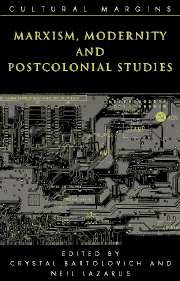Book contents
- Frontmatter
- Contents
- 1 Introduction: Marxism, modernity and postcolonial studies
- Part I Eurocentrism, “the West,” and the world
- Part II Locating modernity
- Part III Marxism, postcolonial studies, and “theory”
- 10 Postcolonial studies between the European wars: an intellectual history
- 11 Marxism, postcolonialism, and The Eighteenth Brumaire
- 12 Postcolonialism and the problematic of uneven development
- 13 Adorno, authenticity, critique
- References
- Index
12 - Postcolonialism and the problematic of uneven development
Published online by Cambridge University Press: 22 September 2009
- Frontmatter
- Contents
- 1 Introduction: Marxism, modernity and postcolonial studies
- Part I Eurocentrism, “the West,” and the world
- Part II Locating modernity
- Part III Marxism, postcolonial studies, and “theory”
- 10 Postcolonial studies between the European wars: an intellectual history
- 11 Marxism, postcolonialism, and The Eighteenth Brumaire
- 12 Postcolonialism and the problematic of uneven development
- 13 Adorno, authenticity, critique
- References
- Index
Summary
The paralysis and inconsequentiality of postcolonial theory in the face of globalized capitalism are so patently clear as to make it unnecessary to rehearse any further the criticisms of Aijaz Ahmad, Arif Dirlik, Neil Lazarus, and others (Ahmad 1995b; Dirlik 1994b; Lazarus 1999a; Schulze-Engler 1998; Stummer 1998). The objections to postcolonial theory leveled by these critics range from the charge that it fetishizes textuality and offers a sly if civil evasion of “contemporary imperialist practices” (Davies 1998: 23), to the charge that it exemplifies what Benita Parry calls an “elective disaffiliation from the variable articulations of an emancipatory politics” (1998: 48). This is not just because the genre is devoted to specialized studies of widow-burning or British colonization of the Indian subcontinent, Australia, Canada and South Africa (Ashcroft, Griffiths, and Tiffin 1989). The explanation is more than theoretical or discursive. Robert Young, the editor of the new magazine, Interventions: The International Journal of Postcolonial Studies, identifies its symptomatology: “The rise of postcolonial studies coincided with the end of Marxism as the defining political, cultural and economic objective of much of the third world” (1998: 8–9). This diagnosis is more wishful thinking than a factual statement.
Postcolonialism seems to require a post-Marxism as “supplement,” a prophylactic clearing of the ground (Loomba 1998a; Moore-Gilbert 1997). What is meant by post-Marxism or the “end of Marxism” is really the reconfiguration of the international class struggle between the imperial metropoles and the masses of the periphery.
- Type
- Chapter
- Information
- Marxism, Modernity and Postcolonial Studies , pp. 221 - 239Publisher: Cambridge University PressPrint publication year: 2002
- 6
- Cited by

